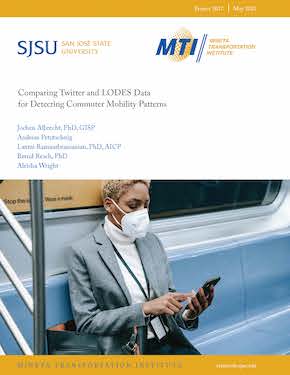- 408-924-7560
- mineta-institute@sjsu.edu
- Donate
Comparing Twitter and LODES Data for Detecting Commuter Mobility Patterns
Local and regional planners struggle to keep up with rapid changes in mobility patterns. This exploratory research is framed with the overarching goal of asking if and how geo-social network data (GSND), in this case, Twitter data, can be used to understand and explain commuting and non-commuting travel patterns.
The research project set out to determine whether GSND may be used to augment US Census LODES data beyond commuting trips and whether it may serve as a short-term substitute for commuting trips. It turns out that the reverse is true and the common practice of employing LODES data to extrapolate to overall traffic demand is indeed justified. This means that expensive and rarely comprehensive surveys are now only needed to capture trip purposes. Regardless of trip purpose (e.g., shopping, regular recreational activities, dropping kids at school), the LODES data is an excellent predictor of overall road segment loads.
JOCHEN ALBRECHT, PhD
Jochen Albrecht is a professor of computational geography at Hunter College, City University of New York. His general research centers on modeling and analysis of spatio-temporal phenomena. On the transportation side, Jochen specializes on multi-model modeling in realistic (complex) settings that allow decisionmakers to explore policy options. He is renowned for his work on standardizing geospatial workflows, which forms the basis of his third monograph in addition to his 56 peer-reviewed publications. Jochen serves on the board of directors for the Urban and Regional Information Systems Association, the GIS Certification Institute, and the California Geographic Information Association.
ANDREAS PETUTSCHNIG
Andreas Petutschnig is a PhD candidate at the Department of Geoinformatics (Z_GIS) at the University of Salzburg, Austria. He received his BEng in Cartography and Geomedia-technology at the University of Applied Sciences in Munich, Germany, and his MSc in Applied Geoinformatics at the University of Salzburg, Austria. His research revolves around the analysis of geo-social network and mobile sensor data, mostly focusing on the spatiotemporal analysis of human mobility and other mobile phenomena, including visualization.
LAXMI RAMASUBRAMANIAN, PhD
Laxmi Ramasubramanian is professor and chair of the Department for Urban and Regional Planning at San José State University. Her research examines the complexities, considering both the opportunities and the constraints, associated with planning with advanced digital technologies. She is a pioneer in the development of concepts and methods to advance participatory GIScience research. Her recent work emphasizes investigations of community resilience in the wake of large-scale social-ecological disruptions and the development of a critical planning education to advance a more just and equitable society. She has published two books, several peer-reviewed publications, and has presented her work at national and international conferences. In 2019, she received the Dale Scholar Prize for advancing reflective practice from CalPoly Pomona. She is a past president of the University Consortium of Geographic Information Science and the incoming president of the Association of the Collegiate Schools of Planning.
BERND RESCH, PhD
Bernd Resch is an Associate Professor at the University of Salzburg’s Department of Geoinformatics (Z_GIS) and a Visiting Scholar at Harvard University. Bernd did his PhD in the area of “Live Geography” (real-time monitoring of environmental geo-processes) jointly with the University of Salzburg and MIT. His research interest is understanding cities as complex systems through analyzing a variety of digital data sources, focusing on developing machine learning algorithms to analyze human-generated data like social media posts and physiological measurements from wearable sensors. The findings are relevant to a number of fields including urban research, disaster management, epidemiology, and others. Bernd received the Theodor Körner Award for his work on urban emotions. Amongst a variety of other functions, he is an Editorial Board Member of IJHG, IJGI, PLOS ONE, and Urban Planning, a scientific committee member of various international conferences (having chaired several conferences), an Associated Faculty Member of the doctoral college GIScience, and an Executive Board member of Spatial Services GmbH.
ALEISHA WRIGHT
Aleisha Wright is a Master’s student and Research Assistant in the Urban Planning Program at San José State University. She received her BA in Environmental Studies with a minor in Psychology at Winthrop University in South Carolina. Her research focuses on improving sustainable public transportation in the San Francisco Bay Area with an emphasis on expanding affordable Transit-Oriented Development in San José.
-
Contact Us
San José State University One Washington Square, San Jose, CA 95192 Phone: 408-924-7560 Email: mineta-institute@sjsu.edu






